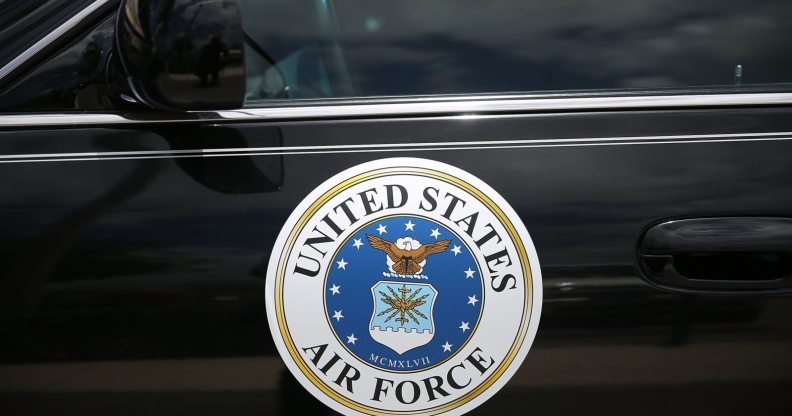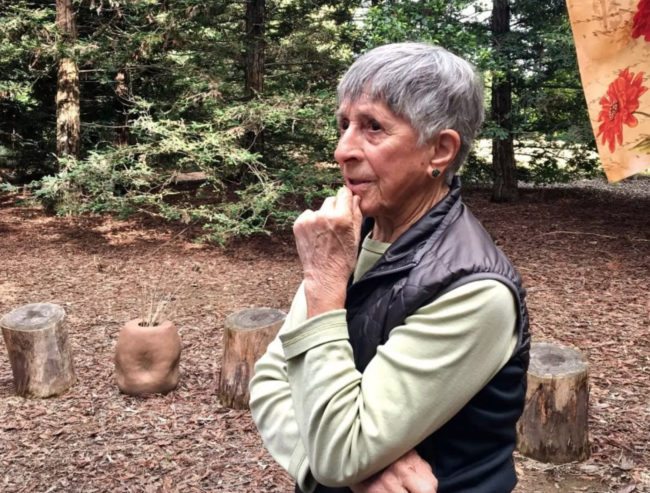This 90-year-old was expelled from the airforce for being a lesbian, so 60 years later she’s suing them

(Photo by Joe Raedle/Getty Images)
A 90-year-old woman who was dishonourably discharged from the air force in 1955 for being a lesbian is suing them, 60 years later.
Helen Grace James grew up on a farm in a small community in northeastern Pennsylvania.
She had always held the military in an important place – her great-grandfather had been a soldier in the Union Army in the civil war, her father fought in WWI, and had cousins and uncles fight in WWII.
Although she didn’t know what a lesbian was, James said had known about her sexuality in a sense since a very young age. She = always preferred trucks and basketball to dolls, and asked to be called Jim. She released when she found herself falling in love with the women she saw in movies.
“I didn’t even know what a lesbian was. I didn’t know that term until later,” she told the Washington Post. “You just didn’t talk about it.”

Helen James
James signed up for the airforce when she was 25, in 1952, and loved the excitement of it, and meeting people from all over the country. She was stationed as a radio operator at Roslyn Air Force base in Long Island, and rose through the ranks.
But during the mid-50s alongside fears of Communism and McCarthy’s Red Scare, there was a witch-hunt for homosexuals infiltrators who they believed may pose a security risk in what became known as the “Lavender scare.”
Service members were told to report anyone they believed may be gay, and experts believe that between 1950 and 1956 as many as 5000 people were removed from the armed forces as suspected homosexuals, at a rate much higher for women than men.
The Air Force’s Office of Special Investigations was searching for gay and lesbian service members and James and two other lesbians on the base suspected their rooms were being searched and they were being followed.

The Lavender Scare
When she left the base one day to have lunch with a female friend, they were followed, arrested and questioned so horribly they made James physically sick.
After days of relentless interrogation, they threatened to tell James’ family and she finally agreed to sign whatever they wanted.
On March 3, 1955, James received an “undesirable” discharge from the Air Force.
She was disgraced by the fellow air base members, who cut the buttons off her uniform in the ultimate military disgrace, and felt she couldn’t go home to her family.
“I had to move myself away. I couldn’t be around my family and friends,” she said. “I couldn’t be in the same area with that shame.”
Related: Fit to serve: Data on transgender military service
She went on to a successful career in physical therapy, but the injustice she faced to the Air Force continued to ripple across the rest of her life.
She couldn’t use the GI Bill to pay for her education, and was denied coverage from USAA, who provide insurance to veterans and their families.
In the 1960s she managed to change her discharge from “undesirable” to “general under honourable conditions,” but she still cannot receive many military benefits, such as being buried in a national cemetery with a colour guard.

(SAUL LOEB/AFP/Getty Images)
Last year, the year she turned 90, James officially applied for an “honorable” upgrade, but was told the records had been destroyed. She was then told that a decision had been made, but she couldn’t find out what it was until the board’s executive director signed.
She still hasn’t been told, so last week she filed a federal lawsuit against the U.S. Air Force.
She says the discrimination she faced 60 years ago has pushed her to excel in the rest of her life, to prove a point, but she needs the upgrade to restore her dignity as a veteran.
“I’ve done this all because I’ve been pushed. I need to do as much as I can to prove I’m a good person,” she said. “I still wasn’t whole.”
“It has crippled her throughout her life,” James’s attorney, J. Cecilia Kim, told The Post. “This is really so she’s not treated as a second-class citizen anymore.”
And her chances look good. In 2016, Hubert Edward Spires filed a similar lawsuit to get his discharge changed, after he was expelled from the airforce for being gay in 1948.
He was told “If you don’t tell us whether you are gay, we will court-martial you!”
Last year, aged 91, he received a call saying his “honourable” upgrade had been successful.
His response: ‘It’s about time.’

